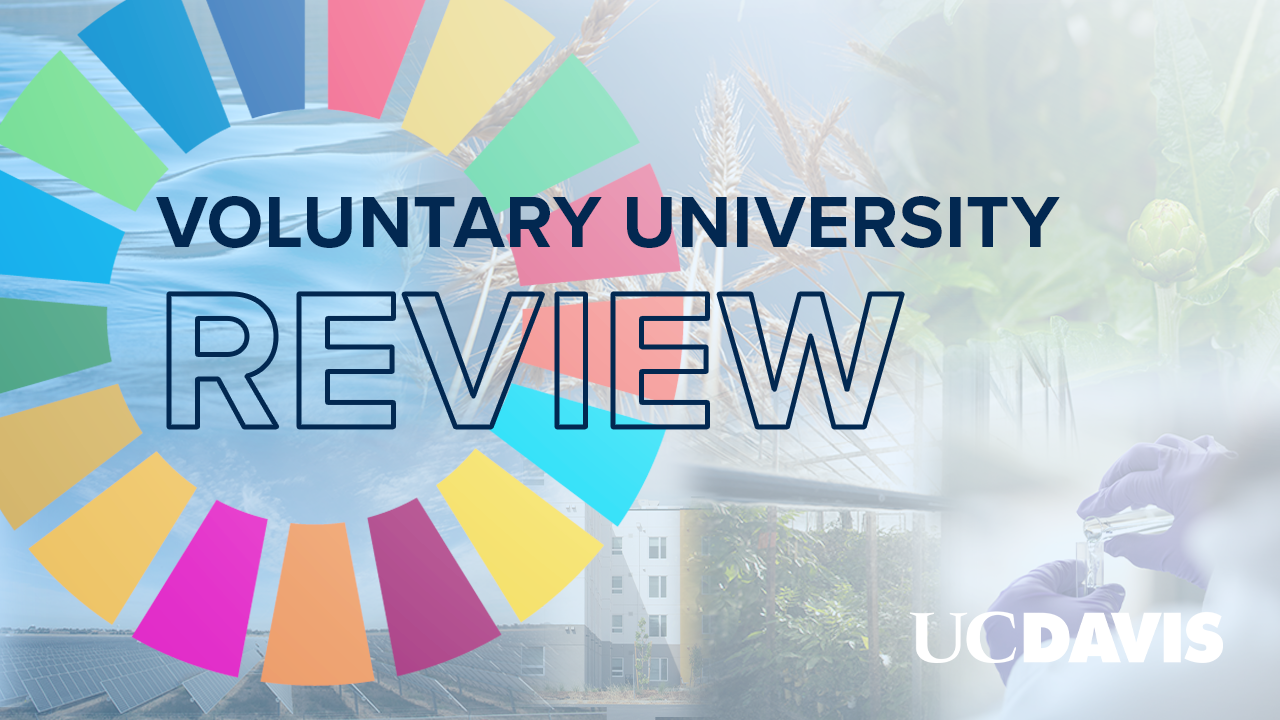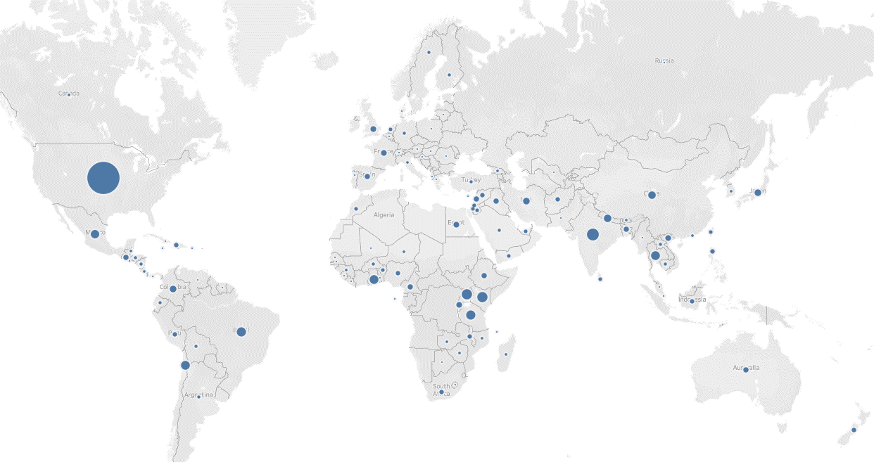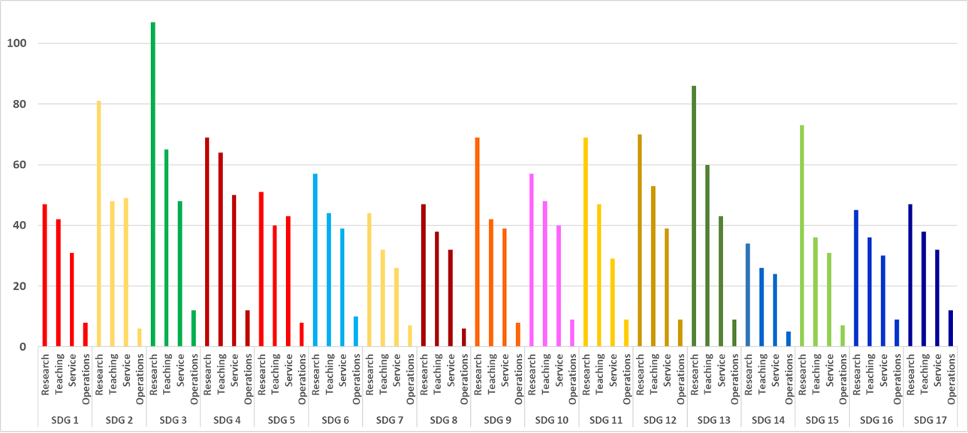
UC Davis Launches Voluntary Review of Global Sustainable Development Goals
First-ever report measures UC Davis progress, highlights campus strengths, and presents key findings within globally recognized framework
Aligning with its mission as a public, land-grant, and comprehensive research university, UC Davis has launched its first-ever Voluntary University Review (VUR) of its engagement with the UN Sustainable Development Goals (SDGs).
An ambitious set of 17 global goals, the SDGs were adopted by all UN member states in 2015, laying out a framework to end poverty, rescue the planet, and build a peaceful world while calling for all sectors of society to achieve these goals by 2030. The SDGs include goals such as zero hunger, good health and well-being, reduced inequalities, and climate action—all of which are interlinked and increasingly borderless.
Led by a partnership between UC Davis Global Affairs, Sustainability, and Office of Diversity, Equity and Inclusion, the first-ever UC Davis VUR covers education, research, service, and operations. While the partnership team recognizes this inaugural VUR is not comprehensive, it begins to measure UC Davis progress in addressing the SDGs, builds awareness, highlights campus strengths, and presents key findings and next steps as UC Davis continues to actively engage on SDG-related programs and projects with collaborators across campus, the community, region, and world. UC Davis is among the first universities to complete this type of review, similar to how countries and cities around the world have used the globally recognized SDG framework and review process to share experiences, strengthen institutions, and mobilize partnerships.
“This Voluntary University Review is truly an exciting step in documenting UC Davis’ global and local engagement and our higher education role in creating a better world. The SDGs provide us with a global and common language for addressing challenges, collaboratively and equitably. The report highlights UC Davis’ unique commitment and contributions to social, racial, and environmental justice. It also highlights the tremendous connections between the local and the global,” says Joanna Regulska, vice provost and dean of Global Affairs.
According to data collected for the VUR, UC Davis students, faculty, and staff are participating in more than 2,580 SDG-related activities, addressing all 17 SDGs across more than 80 countries, with over 50% working collaboratively in the United States. Almost 15% of survey respondents indicated their SDG activities are global rather than focusing on a particular region.

“Sustainability assessments are critical strategic tools for helping us understand where and how we can have impact. The VUR creates a new framework to assess UC Davis’ contributions toward the SDGs. The SDGs inherently connect environmental and social sustainability, which resonates. We won’t have planetary health without equity and justice for all people, and we won’t have equitably and justly served people without a healthy planet. This new assessment, the VUR, can help our campus strategize ways to continue building our capacity locally and globally to address these fundamental interconnections,” said Camille Kirk, director of Sustainability and campus sustainability planner.
Over several months, information for the VUR was collected from two online surveys with more than 260 respondents as well as Forums on the SDGs that included more than 300 members of the campus community and informal Coffee Hours on the SDGs. The team did outreach to all 10 UC Davis colleges and schools as well as centers and institutes. Thirteen undergraduate students contributed to the research, analytics, and design. Three Hubert H. Humphrey Fellows with expertise on the SDGs conducted a course assessment, finding that 1,408 out of 2,647 Spring Quarter 2021 courses contained SDG-related objectives. Seventeen faculty members served as readers for the chapters specific to each SDG. Additionally, the campus’ recent comprehensive STARS report and annual sustainability reporting were used in producing the VUR.
“I’m very pleased that UC Davis is participating in the VUR because the work of our campus community covers so many of the 17 SDGs. The campus is involved in research that connects to global endeavors, and I’m glad that we have a chance to share and highlight what is being done in these areas of challenge – we are addressing global problems, and people from all backgrounds are involved in developing solutions. I learned about the SDGs at an engineering conference in Cartagena, Colombia, several years ago, and I was deeply inspired. I am proud of UC Davis and the way that so much of our work connects to the United Nation’s goals for peace and prosperity,“ said Renetta Garrison Tull, vice chancellor of Diversity, Equity and Inclusion.
For the second year in a row, in 2021, UC Davis tied for the top spot for diversity, inclusiveness, and internationalization in the QS World University Rankings: USA. UC Davis continued to rank first in North America, for the fifth year in a row, in environmental sustainability in North America in the 2020 UI GreenMetric World University Rankings. Within the key findings, the VUR highlights the importance of global partnerships and the interdisciplinary and collaborative nature of UC Davis. Most students, faculty, and staff self-reported that they work on more than one SDG, with SDG 3: Good Health and Well-Being having the highest number of self-reported activities, followed by SDG 13: Climate Action, SDG 4: Quality Education, and SDG 2: Zero Hunger.

This chart shows self-reported SDG activities by SDG and activity type. SDG 3: Good Health and Well-Being had the highest number of self-reported activities, followed by SDG 13: Climate Action, SDG 4: Quality Education, and SDG 2: Zero Hunger.
“We hope the report and next steps bring together many more people and spark many more conversations, collaborations, and actions. Our collective future depends on it,” said Regulska.
Key Findings
- The VUR process reinforced the value of the 2030 Agenda as a unifying framework that bridges disciplines and fosters a culture of campus engagement on local and global challenges. The Agenda directly supports UC Davis' commitments to environmental, social and racial justice.
- UC Davis is engaged in a broad range of activities that support the full scope of the 2030 Agenda and the core principle of Leave No One Behind. All SDGs are represented in Research, Teaching, Service and Operations.
- UC Davis faculty, staff and students self-reported that they were engaged in 2,583 SDG-related activities taking place globally. Research, teaching and service activities are distributed across 82 countries and every continent. About 50% of survey respondents indicated that their SDG–relevant work takes place in the United States.
- The VUR revealed the difficulties in creating a comprehensive picture of SDG efforts across a large research university. UC Davis utilized various sources to collect and analyze SDG-related activities, but these efforts were subject to the limitations of existing data collection tools. This VUR could not capture every SDG activity occurring at UC Davis.
- The VUR highlighted the ways that the UC Davis organizational structure shapes a culture of collaboration and interdisciplinary approaches. Faculty are engaged in a multiplicity of academic units, centers and institutes, and more than 50% of graduate programs at UC Davis are organized as interdisciplinary graduate groups (a unique structure of inter-departmental collaboration). Faculty, staff and students who self-reported indicated that they work on more than one SDG, demonstrating that the SDGs are integrated and indivisible.
- The VUR process highlighted that numerous individuals and units are championing the SDGs across campus by incorporating the SDGs through their own work. The VUR also revealed emerging opportunities to connect in a campus community of practice on the SDGs.
- The number of publications related to SDGs increased for almost all of the SDGs over the period 2016-20. The increase was highest for SDG 4: Quality Education, SDG 5: Gender Equality, SDG 10: Reduced Inequalities, SDG 11: Sustainable Cities and Communities, SDG 12: Responsible Consumption and Production and SDG 13: Climate Action. The COVID 19 pandemic had a visible effect on publications that addressed the SDGs. The number of publications decreased for SDG 1: No Poverty, SDG 2: Zero Hunger, SDG 8: Decent Work and Economic Growth and SDG 15: Life on Land, but the number of publications increased for SDG 4: Quality Education, SDG 5: Gender Equality, SDG 12: Responsible Consumption and Production and SDG 13: Climate Action.
- More than 50% of courses offered during the Spring 2021 Quarter were determined to have content related to the SDGs. Most of these courses focused on SDG 3: Good Health and Wellbeing, SDG 8: Decent Work and Economic Growth and SDG 15: Life on Land.
- UC Davis faculty, staff and students self-reported that they were engaged in about 625 service activities globally, or about 24% of all self-reported SDG activities. These activities were concentrated within the United States and tended to focus on SDG 2: Zero Hunger, SDG 3: Good Health and Wellbeing and SDG 6: Clean Water and Sanitation.
- The VUR underscored that UC Davis is making steady strides toward a more sustainably operated campus, but has room for further improvement. Sustainability created a crosswalk between the SDG targets and the 2020 Sustainability Tracking, Assessment & Rating System (STARS) Report, which showed that 112 of the 169 individual SDG targets are being addressed through campus operations.
- This VUR highlighted the vital importance of external partnerships and collaborations – at the local, domestic and international levels. UC Davis is working with local communities and partners around the world. This is also reflected in international collaborations on publications, which were highest for SDG 2: Zero Hunger, SDG 7: Affordable and Clean Energy, SDG 11: Sustainable Cities and Communities and SDG 13: Climate Action.
- A multitude of strategic plans, entities and activities at UC Davis are in alignment with and making strides towards achieving the SDGs across research, teaching, service and operations, but there are opportunities to improve and to explicitly connect these efforts directly to the 2030 Agenda.
More Opportunities to Engage with the SDGs at UC Davis
- Forums on the SDGs. These quarterly forums are focused on stimulating a UC Davis community of practice to work together and help chart a course for intentional and sustained commitment to the SDGs.
- Conference Grants for SDGs. These grants support UC Davis faculty, staff, and student participation in important dialogues, facilitate global connections and collaborative relationships, and expand the visibility of campus efforts that promote the SDG Agenda.
- Grants for Advancing Sustainable Development Goals. Each year, these grants facilitate multidisciplinary and global faculty teams working on the economic, social, and environmental issues that are critical to humankind at the local, regional, national, and international levels.
- The Green Initiative Fund. A grant funding program hosted by UC Davis Sustainability that promotes sustainable development by providing necessary funding to UC Davis students, staff, and faculty as they develop and administer student-centered sustainability projects.
- SDG Internship for Students. Committed to fueling awareness and implementation of the SDGs, Global Affairs created an internship so students could more directly support the advancement of these goals.
- Campus Global Theme. The Campus Global Theme program identifies a topic linked to one or more of the SDGs and engages the entire UC Davis community in related discussion, learning, discovery, and action.
- Global Conversations Series. This ongoing events series facilitates knowledge-sharing among UC Davis experts and external experts on global topics, challenges and opportunities—including those outlined in the SDGs.
- Global Aggies Confronting Global Challenges. Read some of the stories of members of the UC Davis community collaborating with communities, locally and globally, to confront global challenges and contribute towards the SDGs.
About Global Affairs
Global Affairs brings the world to UC Davis, welcoming more than 10,000 international students, scholars and leaders, and hosting programs that inspire global curiosity, understanding and engagement. Compelled by the valuable outcomes of thinking globally, we make transformative opportunities a reality by supporting the thousands of students and faculty learning and researching globally—and by facilitating collaborations that tackle the world’s most pressing challenges through more than 150 global partnerships. Putting our vision of a UC Davis community that engages, thrives, and leads in this interconnected world into action, Global Affairs is in pursuit of an ambitious goal: Global Education for All.
About Sustainability
Sustainability is the lead office for campuswide sustainability efforts. We provide vision, direction and support for sustainability in all its dimensions, from campus infrastructure and operations to programs that enhance understanding and motivate action toward a more environmentally and socially sustainable campus. Our role is to demonstrate leadership, foster connections, and create a culture of sustainability. Sustainability is responsible for performance assessment and reporting to campus and university leadership as well as external governing agencies.
About Diversity, Equity and Inclusion
The Office of Diversity, Equity, and Inclusion (ODEI) leads UC Davis efforts to build a more diverse, equitable and inclusive university through the implementation of five campus-wide goals that are guided by the UC Diversity Statement and the UC Davis Principles of Community. ODEI is comprised of four units: the Office of Campus Community Relations, the Office of Academic Diversity, the Office of Diversity and Inclusion (Davis Campus) and the UC Davis Health’s Office for Equity, Diversity and Inclusion. Affiliated units include the Office for Student and Resident Diversity, Faculty Development and Diversity at UC Davis Health and the UC Davis Center for Reducing Health Disparities.